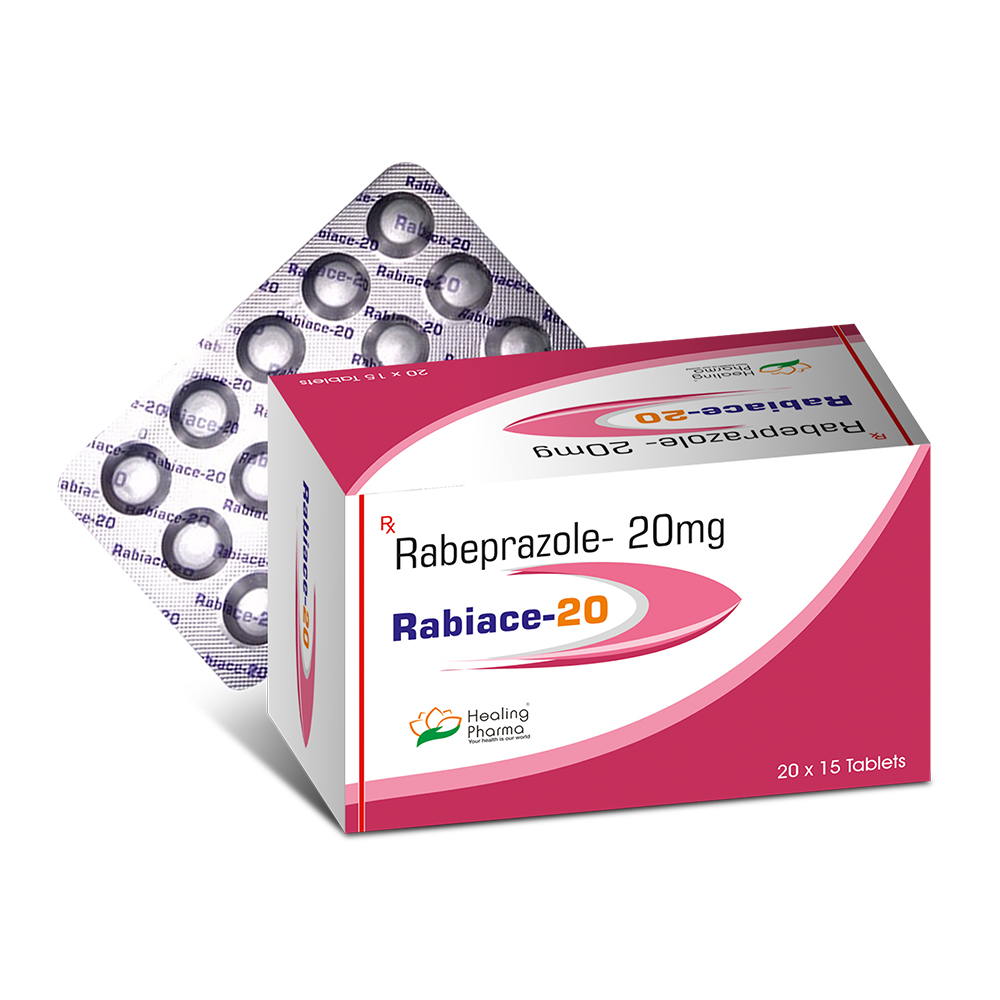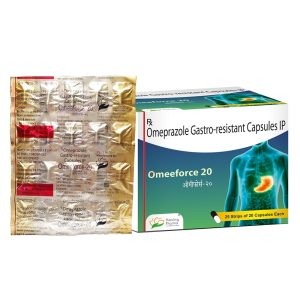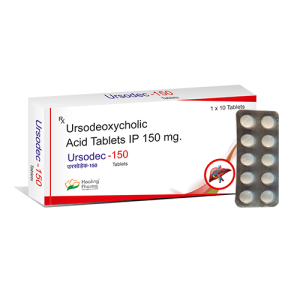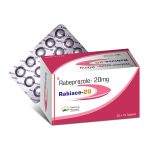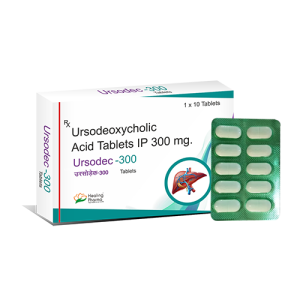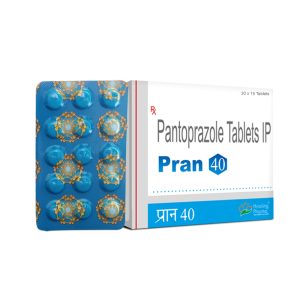Rabeprazole (Rabiace 20) 20 mg tablet is an antiulcer drug in the class of proton pump inhibitors used to treat conditions caused by excessive acidity in your stomach such as ulcers in the stomach or duodenum, reflux disease and hypersecretory conditions. This medicine may also be used together with other medicines to treat a specific type of stomach problem caused by Helicobacter pylori bacteria.
Drug =Rabeprazole
Number of Pills Per Order = 15
Strength = 20 mg
Manufacturer = Healing Pharma
How To Take
Ask your doctor or pharmacist about whether you should take this medicine with or without food. Different brands of Rabeprazole may be taken differently. Try to make it at the same time each day.
If you are taking the tablet, swallow it whole. Do not divide, crush or chew the tablet.
Your doctor will decide the dose of this medicine. Your doctor will advise you on the dosage and course of your treatment depending on your condition.
Rabeprazole must be taken regularly for it to be effective. Continue taking this medicine even when you feel better. Do not stop taking it unless instructed by the doctor.
Take Rabeprazole precisely as directed by your doctor or according to the instructions on the label. Do not take more or less than instructed by your doctor.
Dosage of Rabeprazole (Rabiace 20) 20 mg
Adult: Peptic ulcer: 20 mg once daily for 4-8 weeks (duodenal ulcer) or 6-12 weeks (gastric ulcer).
Gastro-oesophageal reflux disease: Usual dose is 20 mg once daily for 4-8 weeks. Maintenance: 10 or 20 mg daily depending on the response.
In patients with the symptomatic disease without esophagitis: 10 or 20 mg once daily for four weeks. Once symptoms have resolved, 10 mg once daily as needed.
Erosive esophagitis: 20 mg daily for 4-8 weeks. The maintenance dose is 10 or 20 mg daily depending on patient response.
Zollinger-Ellison syndrome: 60 mg daily, may titrate up to 100 mg daily as a single dose or up to 120 mg daily in 2 divided doses if necessary.
Eradication of H. pylori-associated with peptic ulcer disease: In combination with clarithromycin 500 mg twice a day and amoxicillin 1g twice a day: 20 mg twice a day for seven days.
Missed Dose
If you miss a dose, skip the missed dose and return to your usual dosing schedule. If you often forget to take your medicine, let your doctor and pharmacist know.
Do not double a dose under any circumstances.
Overdose of Rabeprazole (Rabiace 20) 20 mg
If you think you may have used Rabeprazole more than the usual dose, please seek medical help immediately.
Contraindications
People with the following medical conditions should not take Rabeprazole:
- Concomitant use with rilpivirine.
Side Effects
Rabeprazole may have the following side effects:
- New-onset or exacerbation of subacute cutaneous and systemic lupus erythematosus
- Osteoporosis-related bone fractures
- Fundic gland polyps
- Acute interstitial nephritis
- Clostridium difficile-associated diarrhoea (hospitalized patients)
- Hypomagnesaemia
- Vitamin B12 deficiency
- Diarrhea
- Vomiting
- Nausea
- Abdominal pain
- Constipation
- Flatulence
- Back pain
- Asthenia
- Influenza-like illness
- Hepatic encephalopathy
- Hepatitis
- Infection (e.g. Salmonella, Campylobacter).
- Increased liver enzymes
- Headache, dizziness
- Insomnia
- Cough
- Pharyngitis
- Rhinitis
Warnings
Inform your doctor and pharmacist if you are taking any of these medicines:
- Ketoconazole
- Itraconazole
- Tacrolimus
- Methotrexate
- Warfarin
- Atazanavir
- Nelfinavir
- Saquinavir
Inform your doctor and pharmacist if you are taking any other medicines, including herbal tonics such as traditional Chinese medicines, supplements and non-prescription medicines.
This list does not include all medicines that may interact with Rabeprazole.
How Does Rabeprazole (Rabiace 20) 20 mg Work?
Rabeprazole is a proton pump inhibitor that suppresses the secretion of gastric acid by inhibiting H+/K+ ATPase at the secretory surface of the gastric parietal cell.
Uses
Rabeprazole is used to treat the following conditions:
- Peptic ulcer
- Gastro-esophageal reflux disease
- Erosive oesophagitis
- Zollinger-Ellison syndrome
- Eradication of H. pylori-associated with peptic ulcer disease
Special Precautions and Connected Warnings
Take special precautions if you have the following conditions:
- Patients at risk of osteoporosis
- Reduced body stores or with risk factors for vitamin B12 malabsorption
- PPI-induced autoimmune disease
- Severe hepatic impairment
- Children and the elderly
- Pregnancy and lactation.
- Avoid alcohol
- Do not eat raw food or food that is not cooked thoroughly, such as sushi and soft-boiled eggs.
- Meat should be cooked until well-done.
- Do not take unpasteurized whole milk, cheese or fruit juices.
- Spicy food and carbonated “fizzy” drinks like soft drinks should also be avoided.
- Eat small but frequent meals as large single meals may increase the pressure in your stomach, leading to reflux.
- You should try to avoid lying down soon after eating as this may worsen reflux symptoms.
- It may be helpful to discuss your diet with your doctor or dietitian as a change in diet may help improve your symptoms.
Storage Conditions
- Store below 30°C. Protect from moisture.
- Store in a cool, dry place away from the reach of children.
- Do not use Rabeprazole that is expired or out of date.

